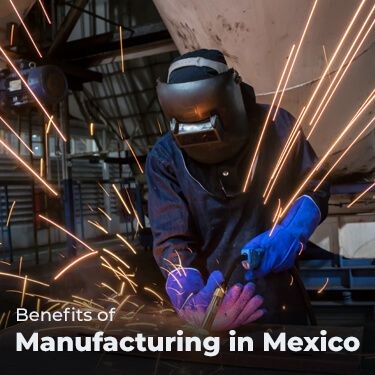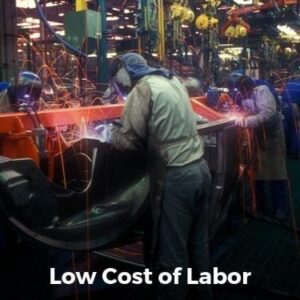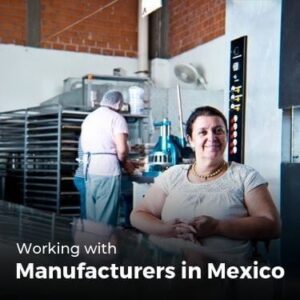
By
 Copy URL to Clipboard
Copy URL to Clipboard
In 2023, Mexico overcame China to become the U.S.’s top trading partner. Due to ongoing trade wars with China and various global conflicts, many businesses have begun to move their manufacturing closer to home. Mexico in particular has many benefits that have made it popular amongst U.S. businesses.
Key takeaways:
To help you understand the benefits of manufacturing in Mexico, I’ll give you a breakdown of each one so you know what to expect.
Table of Contents

Mexico can be a great place to set up your manufacturing operations. By moving these processes closer to the U.S., you won’t need to wait nearly as long for your freight to arrive in the country. Numerous cities in Mexico have become popular locations for manufacturing because of their closeness to Texas, New Mexico, Arizona, and California.
This includes:
If you don’t want to set up your own facilities, look into Mexican factories called maquiladoras. There are thousands of these facilities located near the U.S./Mexican border. Hundreds, if not thousands, of different products can be manufactured according to your own specifications.
Their locations mean it won’t take long for your goods to cross into the U.S. after they’ve been shipped from one of these factories.
Transit times for Mexican goods can vary based on where you’re located in the U.S., but it shouldn’t take longer than a week for your freight to arrive.
Mexico’s proximity also makes truck transport a viable way of moving cargo into the United States. To demonstrate this, I’ve provided data from the Bureau of Transportation Statistics that shows the frequency different modes of transport used to import cargo from Mexico.
| Mode of Transport | Amount Used To Transport Freight |
| Truck | 71% |
| Vessel | 12% |
| Rail | 12% |
| Air | 3% |
| Pipeline | 2% |
Provided by the Bureau of Transportation Statistic
Truck shipping is a convenient and cheap way of moving Mexican freight into the country. You can also combine it with other methods of shipping if needed.
Related: Mexico to U.S. Trucking Companies: What To Look for

While the averagy pay for workers can vary in Mexico, they’re comparable to that of workers in other common manufacturing zones, such as China. Entry-level manufacturing workers earn about $4.90 per hour, while experienced workers make between $7-8 per hour.
Once your goods have been made, you might need a place to store them until you want to bring them to the states. Fortunately, warehouse rent in Mexico costs between $4.37 and $9.57 per square meter as of 2023. You can find prices like these in a variety of Mexican cities.
This includes:
In addition to the low rent, warehouses in Mexico are known for their safety and quality.

With such a low cost in labor, it’s fair to wonder if the products you’ll receive will be high quality. Fortunately, Mexico is home to a workforce with diverse skills that take pride in their work. Some are seasoned technicians, while others are experienced engineers.
Regardless of what you need, you’ll have access to an extremely talented pool of workers that can make a variety of products. Even when laborers don’t have a wealth of experience, they have transferable skills that allow them to be trained to perform more complex tasks. Mexican workers in maquiladoras use their skills to make all kinds of high-quality goods.
This includes:
In addition to the skilled and diverse workforce in Mexico, the median age in the country is 29. This means there’s a young and dynamic population of workers that’s ready to innovate and give fresh perspectives.

The U.S. is the largest source of Foreign Direct Investment (FDI) in Mexico. Much of the investment goes into the northern states that are close to the U.S. border. All the U.S. FDI that’s been funneled into Mexico has made the country an appealing place to manufacture.
Numerous companies have already set up their production operations in Mexico as a result, including major names like:
Companies like GM and Medtronic have been manufacturing here for decades. Others have been operating in the country for a far shorter amount of time. They are all benefiting from the popular perks Mexico presents:
While these factors bring in more U.S. FDI, they also lead to increased manufacturing operations. Numerous natural resources allow factories to create an assortment of goods. Maquiladoras located in SEZs will enjoy the benefits of favorable economic regulations.
A strong economy typically correlates with high productivity and a strong workforce. Therefore, you can expect your manufacturing operations to run smoothly and efficiently.

The United States-Mexico-Canada Agreement (USMCA) is a free trade agreement (FTA) that was established in 2020. It’s an improvement of the North America Free Trade Agreement (NAFTA) that came before it. USMCA eliminates duty rates on nearly every product that originates in Mexico.
This will help reduce the costs you’ll have to pay when importing your manufactured goods. To enjoy preferential tariff treatment, you’ll need to a certificate of origin. While there’s no specific format for this document under USMCA, your document should have nine essential data elements.
This includes:
Besides preferential tariff treatment, there’s an assortment of perks that USMCA has to offer.
All these provisions will make importing any goods you manufacture in Mexico an easier process.
Having to navigate the time difference between Asia or Europe and the United States can be a headache. You won’t have these problems if you you choose to manufacture in Mexico. The vast majority of the country is in the Central Time Zone, with certain parts being in Mountain and Pacific time.
Chances are, your business will be operating during the same hours as your manufacturer in Mexico. As a result, it’ll be easier for both of you to get in touch with one another throughout the day.
Checking in on your operations will also be easier. If there is an immediate concern that can only be addressed in person, towns along the Mexican border can all be reached in less than a day from anywhere in the continental United States if you travel by plane. In many cases, it’s a matter of just a few hours, depending on where your U.S.-based offices are located.
Any language barriers you run into when manufacturing in Mexico will be easy to overcome. The U.S. is home to numerous citizens that are bilingual in Spanish and English. All you need to do is hire a team that can serve as your line of communication between you and your manufacturer.

While there are many businesses that manufacture in Mexico, their operating structure can vary. There are several ways you could set up your production.
The three primary methods you can choose from includes:
In the following section, I’ll explain how each operating structure works and the benefits you’ll be able to enjoy.
Subcontracting is when one company hires another company to perform all or certain aspects of manufacturing. For example, a U.S. automotive business may hire a company in Mexico to make auto parts for one of their cars. The parts will then be shipped to the U.S. where they’ll be installed on the vehicle.
This method of manufacturing requires minimal capital and has very low legal risks. As a result, both large and small companies in the U.S. can benefit from using it. However, the quality of the work can vary based on the contracted manufacturer.
Establishing a wholly owned foreign subsidiary will require you set up a factory of your own in Mexico. This will be exceptionally more expensive and come with higher legal risks. The upside is that you will have more control over the work that’s done in these factories.
To get established, you’ll need to register under the Manufacturing, Maquila and Export Services Industries (IMMEX) Program. The IMMEX Program is an initiative by the Mexican government that provides tax and customs benefits to foreign companies that manufacture or assemble goods in Mexico.
To apply to the program, you’ll need to complete two initial steps:
You’ll have to wait for approval from Mexico’s SRE after completing these first two steps. After approval has been given, you may need to provide additional information.
This includes:
After you’ve established the legal infrastructure and have met all applicable tax requirements, you can start looking for the workers to run your warehouse. When searching for talent, you’ll need to ensure you find workers that can perform a variety of tasks.
This includes:
You can begin your manufacturing operations once you’ve hired all the necessary talent to work for your subsidiary.
Becoming a client of a shelter company is another way you can manufacture in Mexico. A shelter company is a legal entity that lets other companies use their facilities for production. When using this method, you’ll set up your manufacturing under a license that’s held by one of these businesses.
Since you won’t have a legal presence in Mexico, your company isn’t directly responsible for following applicable regulations. Instead, it will be up to the shelter company to handle these requirements.
In addition to reduced risk, you’ll be able to enjoy other benefits when you become a client of a shelter company:
While shelter companies can be very beneficial, you should vet each one very carefully to find the one that’s best for your business.
Related: Understanding Shelter Services In Mexico
Considering Mexico and China frequently conduct trade with the U.S., it’s a good idea to look at how the two stack up against each other when it comes to production. Unsurprisingly, there are a few key areas where they differ.
This includes:
At most, cargo coming from Mexico will take a week to arrive. Freight traveling from China can take four weeks or more, depending on port conditions. This makes Mexico the clear winner when it comes to transit times.
Shipping costs is another area where these two countries drastically differ. Most cargo that comes into the U.S. from Mexico is transported by truck, which is cheaper than other methods. You can expect to pay an average of $200 for these shipments.
Transporting freight from China is more expensive. Goods have to be loaded into a container and transported by vessel. When they reach a U.S. port, they’re loaded onto a truck and moved the rest of the journey. By the time your cargo arrives, you’ll have spent an average of $4,300.
Regardless of where you choose to manufacture, there will be preparations you’ll have to make before getting started. In Mexico, it takes an average of six days before nearshore operations can begin. This is thanks to the various manufacturers in Mexico that are ready to work for U.S. companies.
In China, it takes 33 days for production operations to begin. The bureaucracy of the Chinese government and language barriers cause frequent delays.
One concern every business has when they outsource their manufacturing is how much they’ll have to spend on foreign workers. Labor costs in Mexico are cheaper than China’s. Expenses for labor are 44% percent higher in China compared to Mexico.
Renting warehouse space South of the border is cheaper as well. In China, the average cost for this service was 104.76 yuan ($14.40) per sq feet during 2023. This is more expensive than warehouse rent in Mexico, which fluctuates between $4.37 and $9.57 per meter.
Related: Mexico to U.S. Trucking Companies
Now that you know the benefits of manufacturing in Mexico, let Mexico Cross Border Freight handle transportion for your valuable goods. We can ship both to and from maquiladores in Mexico, providing door-to-door service.
We have a 99.5% on-time rating and can offer your business full supply chain management with our vast network of carriers. Our team also consists of logistics specialists that are bilingual in Spanish and English. They’ll be able to offer their expertise and help you overcome any language barriers you run into.
If you have imports coming from Mexico, we can help you with clearing customs. The team at Mexico Cross Border Freight know what requirements must be followed for goods to enter the country. We can also help you apply for preferential tariff treatment under USMCA.
Get a quote today or call our team at (866) 335-0495 and see how Mexico Cross Border Freight can help your business thrive.
 Copy URL to Clipboard
Copy URL to Clipboard
